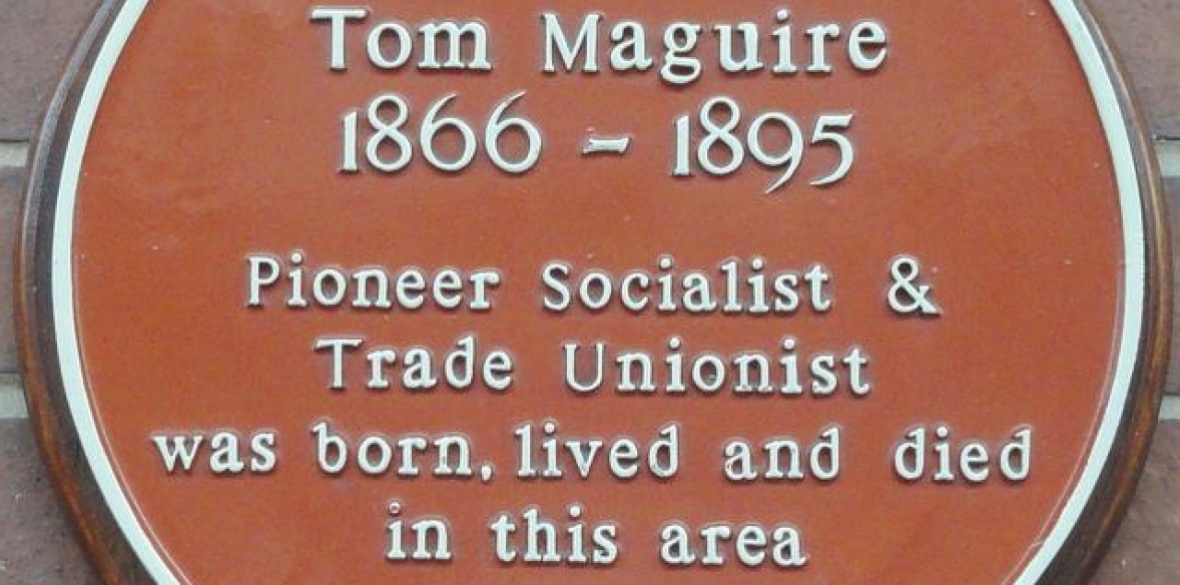This is the last article you can read this month
You can read more article this month
You can read more articles this month
Sorry your limit is up for this month
Reset on:
Please help support the Morning Star by subscribing here
ON Saturday, Unite the Union general secretary Len McCluskey will be delivering the inaugural Tom Maguire Lecture in the beautiful surroundings of Chapel FM Arts Centre — a unique community venue in a spectacularly converted Methodist Chapel — on the Seacroft estate in East Leeds.
Before delivering the Memorial Lecture, I will be joining Len to lay flowers on Maguire’s grave in Beckett Street Cemetery, opposite St James’s Hospital.
I decided to establish an event in memory of Maguire because he was a real Leeds labour and trade union movement hero.
Renowned socialist historian EP Thompson identified Maguire as “the first propagandist of socialism in the city of Leeds” and noted that he had become so when still a teenager.
Former Leeds West Labour MP John Battle remarked that “Tom Maguire contributed 10 intense years of work for socialism in Leeds and Yorkshire as both political organiser, orator and poet,” going on to remark that “some people are comets and in their brief lives light up the world.”
Maguire’s story very much reflects the story of Leeds and East Leeds in particular. He was born in 1866 in the Bank district of East Leeds, the son of immigrants from Ireland.
As the descendant myself of Irish immigrants who moved to “the Bank” in East Leeds, the story of Maguire’s short life struck a chord with me in relation to the literal and metaphorical journey of my own family and that undoubtedly helped to inspire me to establish an event to commemorate his life and contribution.
Maguire was a key organiser of “new unionism” strikes among “unskilled” workers in Leeds and saw the replacement of the influence of the Liberals in working-class communities and in the trade union movement with “a socialist Labour Party” as a key objective.
It was as early as 1887 that he distributed leaflets across Leeds arguing for “the formation of a socialist Labour Party in Leeds,” declaring that “the objects of socialism are […] to put a stop to the mad competition for existence, which is the cause of poverty, and to establish a co-operative commonwealth.”
Rather than the rituals of “aimless general propaganda […] Sunday after Sunday, year in and year out,” he advised that “local abuses should be brought into prominence by means of special agitations.”
Maguire was one of the key figures in new unionism militancy in Leeds in the late 19th century and one of the authors of the initiative of Labour standing its own candidates in elections in Leeds.
Maguire saw this as a practical step to remove the influence of the Liberals. In this way, Maguire founded the socialist currents in both the industrial and political life of Leeds.
Maguire was also a masterful poet. His poetry called the working class to action. In his poem, To The Wage Slave, he scorned defeatist acceptance of exploitation, declaring “none is so foully misshapen as he / That sits idly passive where wrong-doings be!”
In Mammon Land, he casts capitalist-run industrial Leeds — and the whole society of which it was part — as a nightmarish, polluted, sorrowful place in need of radical change: “Yes, Mammon Land is a dismal land / Of blackened streets and stones, / Reared by the cunning of human hand, / ’Mid human oaths and groans.”
Maguire was of the working class as well as for the working class and that comes through in this same poem and in others: “For I am a captive where Mammon sways, / And long have I languished there; / And I know the people, their joyless days, / And the full life load they bear.”
In 1895 Maguire died of pneumonia at the age of just 29. He was found dead, alone in a cold home with no food and no fuel on the fire.
Keir Hardie paid tribute to Maguire, remarking that “the socialist movement, none too rich in men who combine a clear wisdom, unerring judgement and a large sympathetic heart, could ill afford to yield back to the gods one gifted young comrade.”
Maguire’s funeral was huge, accompanied by brass bands playing socialist anthems, and the epitaph on his gravestone reads “Tom Maguire — socialist, bold, cautious, true and a loving comrade.”
The Leeds Mercury’s obituary commented that Maguire “had long given thought to matters affecting capital and labour, and as a public speaker was logical and lucid” and that “his name as a Labour leader was known all over the North of England, and by his death the Labour movement has lost a keen sympathiser and earnest champion.”
The Mercury also referred to the fact that “much of his spare time has been devoted to writing songs and poems.”
Decades later, in his piece Homage to Tom Maguire, renowned socialist historian EP Thompson wrote that “the young men of the Yorkshire ILP [Independent Labour Party] owed much to Tom Maguire. He had been the point of junction between the theoretical understanding of national leaders, the moral teachings of Morris and Carpenter and the needs and aspirations of his own people.
“Nothing in history happens spontaneously, nothing worthwhile is achieved without the expense of intellect and spirit. Maguire had spent his energies without restraint. A poet of real talent, his feelings had been assaulted by the filth of Leeds; the rag, shoddy, and wool-combing industries, with their toll of disease and the dread of anthrax.”
The day before he died, Maguire told one of his friends: “I have so many ideas in me, if only there was someone who could carry them out.”
If only Maguire had lived longer so he could have achieved even more and shared even more ideas and written even more poetry.
But of course, a movement of millions now exists — in our country and around the world — to carry out the socialist ideas of the kind to which Maguire dedicated his short and energetic life.
As one of the many Leeds socialists who has tried to help build upon the foundations laid by Maguire, I’ve established the Tom Maguire Lecture in order to celebrate his life and contribution and to help us to collectively resolve to pursue transformative socialist change in a way worthy of Tom Maguire’s legacy.
I can think of no more appropriate speaker than the general secretary of Unite the Union to deliver the inaugural lecture.
Richard Burgon is shadow justice secretary and Labour MP for Leeds East.











